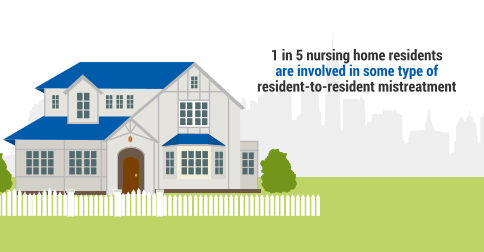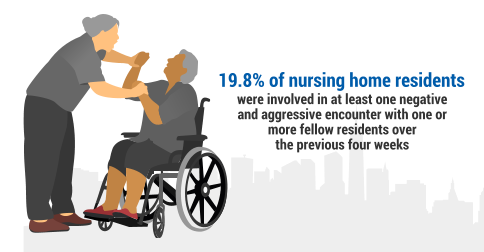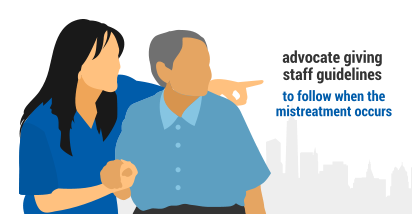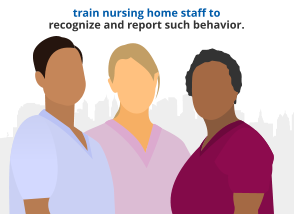
Nursing homes serve a wide variety of residents with different physical and mental conditions. While much has been reported on the abuse of nursing home residents by staff members, a recent study suggests fellow residents also pose a threat. The study shows that 1 in 5 nursing home residents are involved in some type of resident-to-resident mistreatment.

The research, from Weill Cornell Medical College and Cornell University and funded by the National Institute on Aging, found that 19.8 percent of nursing home residents “were involved in at least one negative and aggressive encounter with one or more fellow residents over the previous four weeks,” according to a press release from Weill Cornell Medical College. These encounters ranged from physical abuse to verbal abuse, to inappropriate sexual behavior, to invasion of privacy.
“The findings suggest that these altercations are widespread and common in everyday nursing home life,” said study co-author Dr. Karl Pillemer, a professor of gerontology in medicine at Weill Cornell and the Hazel E. Reed Professor in the Department of Human Development at Cornell University. “Despite the acute urgency of the problem, resident-to-resident mistreatment is under-reported. Increased awareness and the adoption of effective interventions are greatly needed.”
In a New York Times blog post, Pillemer recounted an actual, typical example from the study. One wheelchair-bound resident, Resident A, was yelling in a common area. Resident B went to Resident A and asked the person to be quiet. Resident A then hit the other resident on the hand. A staff member intervened and separated them but then had to attend to someone else. After that, Resident B kicked Resident A.
The researchers randomly selected 10 New York skilled nursing homes and used a number of data-collection sources and methods, including interviewing staff members and a questionnaire for residents and staff, to determine the number of incidents of mistreatment.
The different types of mistreatment found among the residents in the study include:

- Verbal incidents, such as cursing, screaming, or yelling at another person (16 percent).
- Physical incidents, such as hitting, kicking, or biting (5.7 percent).
- Sexual incidents, such as exposing one’s genitals, touching other residents, or attempting to gain sexual favors (1.3 percent).
- Invasion of privacy and other issues, including unwelcome entry into another resident’s room or going through another resident’s possessions (10.5 percent).
The nursing home residents who engage in this mistreatment typically have cognitive disabilities but can still physically move around the facility, Pillemer said in the press release. Many times, these residents suffer from dementia or a mood disorder that can show up as physical aggression or arguments, particularly in the close quarters of a nursing home.
 So, what can be done to minimize resident-to-resident mistreatment at nursing homes? The researchers suggest interventions tailored to the needs and abilities of the people who abuse fellow residents and programs that train nursing home staff to recognize and report such behavior. They also advocate giving staff guidelines to follow when the mistreatment occurs.
So, what can be done to minimize resident-to-resident mistreatment at nursing homes? The researchers suggest interventions tailored to the needs and abilities of the people who abuse fellow residents and programs that train nursing home staff to recognize and report such behavior. They also advocate giving staff guidelines to follow when the mistreatment occurs.
“We urgently need strategies to address this under-recognized problem, which affects fully one-fifth of all residents, erodes their quality of life and is stressful for staff to manage,” said study co-author Dr. Mark Lachs, co-chair of the Division of Geriatrics and Gerontology and the Irene F. and I. Roy Psaty Distinguished Professor of Clinical Medicine at Weill Cornell in the press release.
 The New York Times blog item suggests solutions to the problem aimed at improving the overall quality of life for nursing home residents, including hiring additional staff members, training staff members to reduce conflict, treating residents’ depression, and minimizing areas of congestion in nursing facilities.
The New York Times blog item suggests solutions to the problem aimed at improving the overall quality of life for nursing home residents, including hiring additional staff members, training staff members to reduce conflict, treating residents’ depression, and minimizing areas of congestion in nursing facilities.
If your loved one has been abused or mistreated in a nursing home – either by a staff member or fellow resident – it’s very important to contact a qualified nursing home abuse lawyer as soon as possible.






































